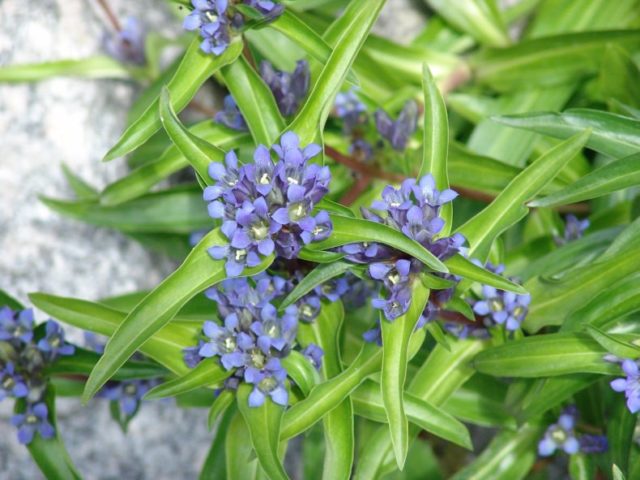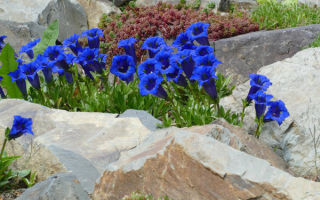Content
The medicinal properties of the herb gentian have long been helpful in folk medicine. And also the plant is used for the manufacture of pharmaceuticals. Preparations and decoctions based on it contribute to the relief of symptoms in various diseases and serve as general tonic. It is important to follow the correct dosage so as not to harm your health.
The chemical composition of the herb gentian
The chemical composition of the herb includes:
- glycosides that enhance intestinal motility;
- vitamin C;
- bioflavonoids;
- slime;
- essential and fatty oils;
- resin;
- bitterness;
- pectins;
- sucrose;
- alkaloids.
Useful properties of gentian
The herb has an anthelmintic effect, therefore it is often included in various pharmaceutical preparations that deal with parasites. The infusion prepared from gentian is taken daily in small quantities. Within a month, the body is cleansed of helminthic invasions, as well as their waste products.
Beneficial features:
- suppresses cough;
- has a positive effect on the digestive tract;
- stimulates appetite;
- lowers the temperature;
- stimulates the liver and heart contractions;
- has an antispasmodic effect;
- has anti-inflammatory, hemostatic and sedative effect;
- relieves cramps;
- strengthens the immune system.
The herb heals:
- constipation;
- arthritis;
- chronic hepatitis;
- diathesis;
- scurvy;
- flatulence;
- gout;
- anemia;
- jaundice;
- eye diseases;
- allergies.
Gentian is used in the treatment of the liver, gallbladder, and also as an antipyretic agent. In Japanese medicine, it is widely used as an antirheumatic, antifebrile and anthelmintic agent.
Gentian herb harm
With unreasonable excessive use, it appears:
- dizziness;
- headaches;
- red spots on the face.
With increased pressure, the herb provokes a hypertensive crisis.
Contraindications to gentian
The herb has a wide range of useful qualities, but not everyone is allowed. It is forbidden to use:
- pregnant women;
- lactating women;
- people with allergic manifestations.
People with gastritis, high blood pressure and stomach ulcers should use the herb with caution.
It can not be used for medicinal purposes by people with high acidity, since because of its bitterness, the mucous membranes of the gastrointestinal tract are irritated.

Rules for the use of gentian herb
Reception of herbal infusions and decoctions should be strictly dosed. Medicines are prepared in several ways:
- For a decoction, 20 g of plant materials are poured into 240 ml of boiling water. Put on medium heat and cook for 10 minutes. After that, filter and cool. Take 20 ml three times a day.
- Infusion of alcohol. In 500 ml of alcohol (you can replace it with vodka), 50 g of dried gentian are poured. Cover with a lid and leave for seven days. Take a maximum of 30 drops, previously diluted with water, three times a day.
- For infusion on water, 80 g of grass is poured into 2 liters of boiling water. Close with a lid and leave for 2 hours. Take 120 ml three times a day. This product can be used for compress and foot baths.
The use of gentian in traditional medicine
For a long time, traditional healers have used gentian to treat tuberculosis, malaria and plague.
A decoction of the plant during flowering is taken for diseases of the nervous system, loss of strength, pain in the stomach and fainting. Aqueous extract of gentian is used as a hemostatic agent. An infusion of herbs and flowers is used for tuberculosis, bronchitis, throat diseases, pneumonia and as an antipyretic agent.
Water-alcohol tincture exhibits anti-trichomonas activity. As part of the collection, the infusion of flowers is used not only internally, but also locally. In Tibet, it is widely used to treat hypoacid gastritis and diseases of the oral cavity.
For acute bronchitis, tonsillitis, aphonia and laryngitis, a remedy is prepared based on 300 ml of boiling water and 8 g of dry chopped grass. Insist 2 hours, filter and take 120 ml five times a day.
Acute respiratory diseases are treated with an infusion prepared from 240 ml of boiling water and 5 g of dry chopped grass. After 1 hour, filter. Take 120 ml three times a day. In this case, the drug must be necessarily warm. If you drink such an infusion half an hour before eating, it will help stimulate your appetite.
The brewed herb and gentian root help increase the body's resistance to infectious diseases and strengthen the immune system. They use it during the entire treatment until ARVI completely disappears. With angina, a sore throat is caressed several times a day.

To improve blood flow in the body, brew gentian tea - 1 tbsp. l. the rhizomes of the grass are poured with 240 ml of boiling water. Boil for 5 minutes. The drink is divided into three parts and drunk before meals.
A decoction of herbs and gentian root has an effective fight against joint diseases of various etiologies. The natural remedy reduces inflammation, relieves pain attacks, restores joint mobility. Decoctions are used externally in the form of compresses, lotions, rubbing. Also used internally.
Excessive sweating - hyperhidrosis - causes great discomfort, as it is accompanied by the appearance of an unpleasant odor. To reduce symptoms or get rid of the disease, special foot baths are made. A decoction made from 60 g of oak bark, 1 liter of boiling water and 100 g of gentian are added to the water, which is boiled for a quarter of an hour and insisted for 45 minutes.
Liver diseases are treated with an infusion prepared from 0.5 tsp. raw gentian and 400 ml of heated water. The listed components are mixed and left overnight, then filtered. It is recommended to take 100 ml of the product four times a day before meals for half an hour.
If you mix 40 g of the plant and 600 ml of alcohol, and then infuse the mixture for 14 days, then the resulting drug will help in the treatment of rheumatism. Infusion is rubbed with the affected joints.
Gentian during pregnancy
Gentian is contraindicated for women at any stage of pregnancy. It tastes very bitter, and therefore causes nausea and vomiting. The substances included in the herb cause an increase in the tone of the uterus.

Rules for collecting and storing gentian
Depending on the type, the gentian can be of different heights. Its flowers are most often colored purple, blue or light blue, but also yellow and white.
For medicinal purposes, all parts of the herb gentian are used: stems, flowers, leaves and roots. It blooms in July and August. Harvested at the beginning of flowering, when the leaves in the root rosette have not begun to turn yellow.It is necessary to cut off the entire ground part, with or without rosette sheets. Dry in one layer in the shade in the air.
The finished raw material can be bundled. A properly dried plant retains its natural color and bitter taste. Has no smell.
The roots are harvested from early September to late October, as well as early spring. They choose specimens that have reached the age of three.
Rhizomes are dug out, carefully clearing from small roots, earth and ground part. Washed in cold water and then chopped. If the root is large in diameter, then divide it in half.
The prepared raw materials are sent to the dryer. If the temperature regime is above 60 ° C, then the gentian is deformed, and the healing properties will decrease. A properly dried product has a bitter taste.
Store blanks in a paper bag or glass jar. The place should be cool, without access to sunlight. The maximum shelf life is five years.
Conclusion
The medicinal properties of the herb gentian have been known since ancient times. It is important to use plant-based infusions and decoctions correctly, otherwise they will cause irreparable harm to health. Before starting treatment, you should consult with a specialist.

